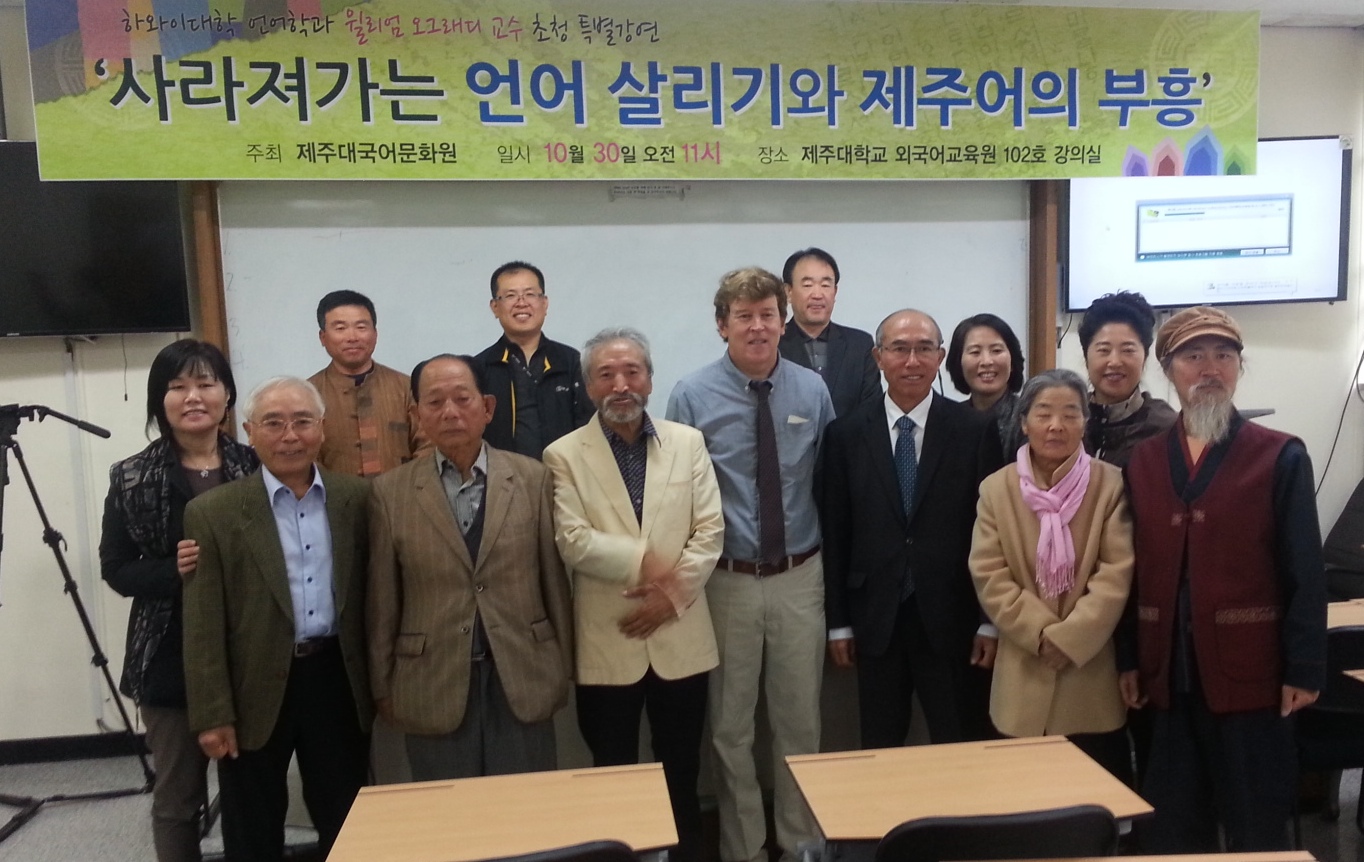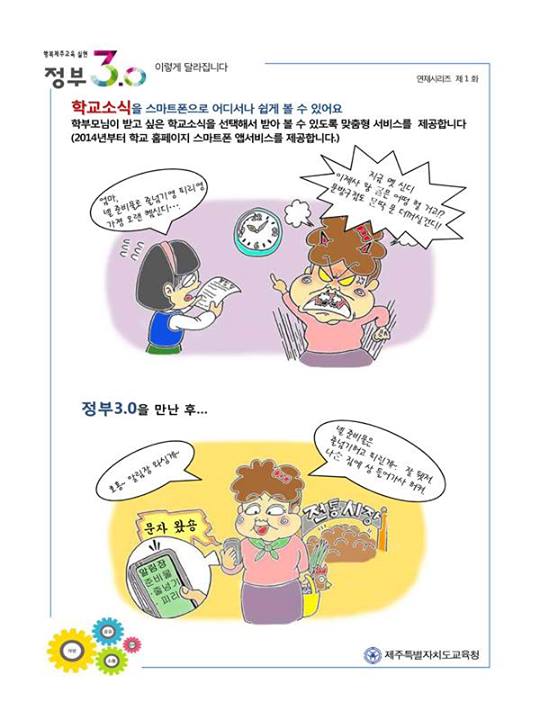| |
 |
|
| ▲ Professor William O'Grady, center, at Jeju National University Foreign Language Institute on Oct. 30. He was calling for increased efforts to save the Jeju language. |
What language is spoken on Jeju Island? It is often referred to as a saturi or bangeon - dialect - but it also attracts the suffix -eo or mal, suggesting a language. Which is it: dialect or language?
William O’Grady, University of Hawaii linguist, made the case for the latter at Jeju National University Foreign Language Institute on Wednesday, Oct. 30, supported by Professor Yang Changyong of the Department of English Education.
Drawing parallels with other minority languages worldwide, the linguist stressed that without protection measures the language - “Jejueo” - would soon disappear, to the poverty of the nation. The US-based native of Canada outlined a blueprint for collaboration between Jeju National University, the Jeju Language Preservation Committee, the University of Hawaii, the Smithsonian Institution and UNESCO.
Classed as moribund, there are just 5 to 10 thousand Jejueo speakers left - the bulk of whom are over 70 - from a population of 600 thousand. UNESCO classes it as “in a critical situation” and it was listed by the organization as “endangered” in 2010.
There are notable differences from standard Korean in grammar and vocabulary and the language is marked by distinct informality while standard Korean is heavily marked by register. Use of Jeju language has even come to be regarded as rude when used with elders in certain situations. The language also retains traces of Old Korean - from which it is chiefly derived - plus Japanese, Mongolian, and possibly Tamna linguistic influences in lexis and grammar.
O’Grady thus proposed that the language deserves recognition not only in its own right, but as the only surviving relative of Korean, its sibling, centuries parted from a common progenitor. To achieve this, a reconceptualization from dialect to language is essential, he argued.
Distinctions have long vexed scholars, but they have been offered. A student of Yiddish scholar Max Weinreich suggested simply: “A language is a dialect with an army and navy."
This strikes at the politicized nature of differentiation. Jeju has long been peripheralized by Seoul, with Jeju profoundly “Othered” by historical forces. For much of history, the island was a place of exile and punishment.
| |
 |
|
| ▲ A government webtoon uses Jejueo as part of the Government 3.0 campaign to improve communication between the government and the public. |
The language, too, came to be regarded as backwards and inferior, as minority speech often is. Speakers themselves are stigmatized and internalize this complex, encouraging language disuse. Once intergenerational transmission stops - hastened by formal schooling enforcing the standard - resurrection becomes problematic.
Children are essential to saving a language, but it must have utility and appeal to them. Jeju children now use mostly standard Korean, with the dialect much changed from the one used by community elders - “Languages change with every generation,” said O’Grady. Even Jeju citizens in their 30s and 40s can have trouble understanding elderly relatives.
Despite being spoken by almost all islanders at the time of liberation from Japanese rule in 1945, the 4.3 Incident (Jeju Massacre) led to up to 30 percent of speakers dying or fleeing between 1947-54. This was coupled with an influx of settlers from the mainland, speaking other dialects, which has only increased up to the present. The drop in prestige for the language was severe: it never recovered.
To turn the tide, O’Grady called for textbooks, magazines, mobile apps and computer software. Jejueo-speaking teachers, administrators and, most importantly, communities are essential. The example of Hawaiian, once reduced to 300 speakers and now used by several thousand, was provided to exemplify what could be achieved, as were other minority languages, such as Welsh in Wales and Frisian in the Netherlands.
O’Grady called for action through acquisition and immersion programs, Jeju-language schools, even its use in university instruction. It was a bold proposal and the linguist conceded that the biggest hurdle is as much within as without, as Jeju people must reassess their relationship with the language.
Language is deeply bound to identity and O’Grady skillfully tapped into Korea’s strong national heritage. Perceived as an independent tongue, Jejueo would then be recognized as Korean’s only surviving relative, a long-lost family member: "Surely, you'd do what you could to help ensure that your sister thrives, wouldn't you?" he appealed.
With public education at the heart of preservation efforts, “The goal is to make Jeju a bilingual province,” O’Grady said. While emotional appeals are sure to attract support, practicalities remain daunting.
Within the rigid education system, where students already juggle English and increasingly Chinese, it is difficult to see a place for comprehensive Jeju language acquisition classes, as opposed to the cultural awareness classes and speech contests that currently exist.
To enable intergenerational transmission and acquisition, systematic instruction is needed in formal schooling from primary to tertiary levels; informal education at weekend schools and lifelong learning centers must also be supported.
Lera Boroditsky, Assistant Professor of Psychology at Stanford University, said:
“Language is central to our experience of being human, and the languages we speak profoundly shape the way we think, the way we see the world, the way we live our lives.”
Despite its listing by UNESCO in 2010, fluent speakers are fast disappearing, each taking with them a unique perspective on the world. If language is the repository of tradition, then Jejueo seems to be going the way of other religious and cultural practices, struggling to find utility in the modern world.
What a shame it would be to lose this island’s cultural ark, genetically embodying native ways of expressing, seeing and being. Jeju poet Moon Chung-sung stated with melancholy:
“Without the Jeju language there is no Jeju people.”
|





















